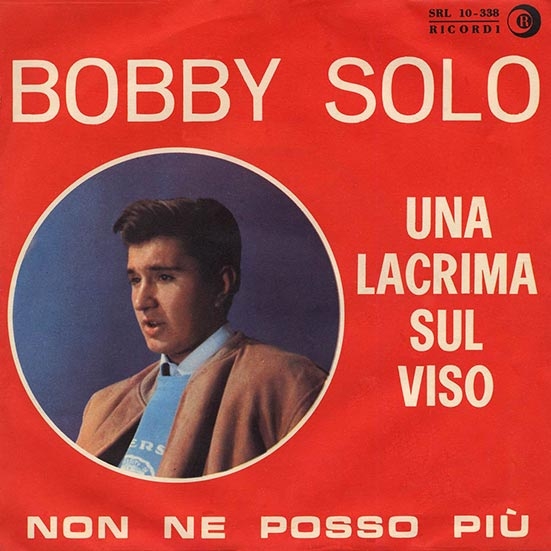Una lacrima sul viso

(Mogol-Bobby Solo) – Bobby Solo, 1964
They were a bit perplexed at Ricordi, and since nothing much was going on, after the second album they sent me to perform at “Ribalta per Sanremo”, an event that was held at the Teatro Lirico di Milano, which also featured Ricky Gianco, Remo Germani, Lilli Tombolato and others I do not remember. I sang live, with a small orchestra that accompanied all the singers, Ora che sei già una donna, with one of those square microphones, the famous AKG D12, which had very rich low frequencies. I already had a naturally low tonality, and since there were no filters or equalizers as there are today, this microphone was already pre-filtering and helped to give body to the voices. Ravera went crazy: he grabbed me, hugged me, escorted me to the dressing room where he complimented me saying: “But you have a beautiful voice!” And immediately called Micocci and Mariano Rapetti (he was the head of the Ricordi record company and father to Mogol). They asked me if I had any musical ideas ready, and then I took the guitar and sang: “Forse dietro quella duna, quando spunterà la luna” on the tune of the refrain of Una lacrima sul viso.
The music for the song was ready, I had written it with a little collaboration from Andrea Lo Vecchio, who never even asked me for as little as 1/24 of the copyright; he helped me to develop the verses, while Carlo Donida and Gianni Marchetti helped me at the recording stage, not asking for anything in return either. When Mariano Rapetti (who for me was a very important man, I considered him almost an uncle and he really loved me, he became very fond of me) heard this sketch of a song, he said: “The music is beautiful, but the lyrics are trite. My son Giulio will take care of them.” Things were becoming even more exciting. The meeting with Mogol was arranged by Micocci, which closely followed the whole operation, and we decided to meet at Piazza Duomo the day when I had to record the song demo.
I thought he would arrive driving a Jaguar, instead he turned up in an old, rusty Renault R4 licensed in Como, because he and his father had a house in Brianza. We introduced ourselves and Mogol said to me: “I haven’t had time to write the lyrics of your song.” And I replied: “But we are supposed to be at the studio in Via dei Cinquecento (where the Ricordi studio was) in an hour’s time to record the demo, what are we going to do now?” And he said: “Don’t worry, take this sheet of paper and get ready to write.” And he dictated all the lyrics as he was driving across Milan towards Corso Lodi to get to the nearby Via dei Cinquecento, a true genius! The lyrics of Una lacrima sul viso were ready in a quarter of an hour! We recorded the demo, and the song was successfully submitted for selection for the Sanremo Festival. Pattacini made a first arrangement for the recording of the album. But the orchestra he had engaged for the occasion was not very good at achieving that pizzicato strappato effect by the strings at the beginning. Even though they played like a symphonic orchestra, that effect didn’t come out well.
Micocci was not at all satisfied, so he called RCA in Rome to see if any of his friends could do it, and decided to have Gianni Marchetti create a new arrangement. So after three years I was going back to Rome, finally. I remember that I arrived by plane and they immediately took me to eat at the restaurant “Le Tavarnelle” in Via Panisperna. I had a bucatino all’amatriciana – which really heartened me after all that Milanese risotto – drank a bit of red wine and, completely cheered up, I got into Maestro Marchetti’s black Millecento and arrived in via Tiburtina. As soon as I saw the RCA sign my heart missed a beat, because I immediately thought of the American RCA, where Elvis recorded. The base was recorded on an Ampex two-track machine modified into a three-track, and was ready for my arrival in studio B. At one point Pino Mastroianni, an RCA technician, looked at me and said: “For the voice I have prepared the BSA compressor that Elvis used in Are you lonesome tonight, the American RCA sent us a copy of it.” Imagine, I was already nervous enough, and knowing that too, I immediately got two or three bits wrong during the first take, then in the second take I missed the refrain, and then it finally came out well, although I remember that we spliced the tapes of the various takes to get the definitive one.
Quoted from: Ceri, Luciano, Il rimmel di Elvis. Conversazione con Bobby Solo, in “Musica Leggera”, n. 3, Marzo-Aprile 2009, p. 30-31
